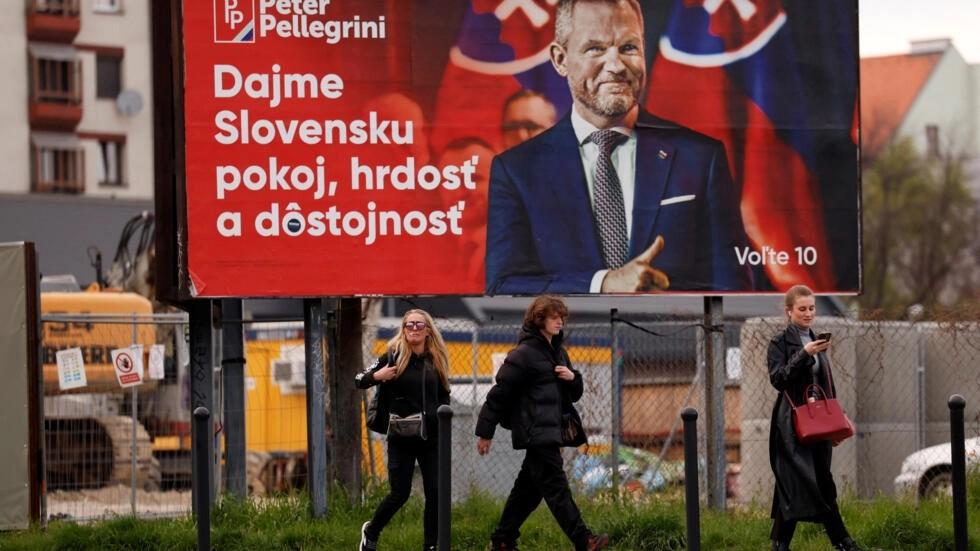Viktor Orban is no longer alone in EU Another victory for the Kremlin in Europe
Residents of Slovakia elected Peter Pellegrini, an opponent of support for Ukraine and a Eurosceptic, as their president. The victory of this populist will further legitimize the power of Prime Minister Robert Fico and his course towards dismantling the institutions of the rule of law.
Now the obstacle in the form of an unfriendly head of state has been removed, and Slovak corrupt officials will begin to catch up with their colleagues from neighboring Hungary by leaps and bounds. Fico and Pellegrini are ready to lose subsidies from the EU budget and are not averse to competing with Viktor Orban for the role of the main “devil’s advocate,” that is, the voice of the Kremlin in the European Union.
Fico's friend
Peter Pellegrini is the speaker of the Slovak parliament and partner in power of Prime Minister Robert Fico. He is his former party member, deputy, and successor as prime minister - after the Slovak government collapsed in 2018, having not survived the scandal with the murder of journalist Jan Kuciak, as well as accusations of corruption and connections with the Italian 'Ndrangheta (the Calabrian version of the mafia). After which Pellegrini left Fico’s party “The Way - Social Democracy” and made his own, calling it “Voice”. With her, he entered the country’s parliament in 2023, where he received the post of speaker, after supporting Robert Fico as the new prime minister and becoming his junior partner in the ruling coalition.
“Ukraine is an enemy”, “We can’t cope without Russia” - such posters appeared in Slovakia during the election campaign. There were two real candidates for the presidency. Former Foreign Minister Ivan Korczok, a Euro-optimist, a supporter of active support for Ukraine and a critic of the first legislative initiatives of the Fitz government aimed at dismantling independent anti-corruption structures in the law enforcement system of Slovakia. The second is Pellegrini, he was considered the favourite from the very beginning.
Pellegrini accused his opponent of wanting to send Slovak soldiers to fight on the side of Ukraine, of the fact that the economic crisis in Slovakia was provoked by too active assistance to the same Ukraine, as well as the allegedly subordinate relations with Brussels that the previous Slovak government had built.

Ivan Korczok was not a bright candidate, but the only thing on his side was the fact that just over 20% of Slovaks voted for Fico’s party in the elections, and after the elections a powerful coalition formed against him, which included the outgoing president Zyuzana Caputova, who decided not to run for a new term. And behind the rather faceless “official,” as Fico’s supporters called him, a serious system of support from Slovak civil society has been built.
However, this turned out to be completely insufficient. All poll-based models, even before the first round of elections, showed that Korczok would win the first round (which is what happened) due to the concentration of votes of liberal and centrist voters, but would lose the second because his opponent would collect all the votes of nationalists and even more radical populists, of which the list of candidates consisted mainly.
And so it happened, Peter Pellegrini predictably won the presidential elections in Slovakia, as sociologists predicted and even though he lost the first round of elections. In the second round, he received slightly more than 53% of the vote. Korchok slightly improved the result of the first round - he scored only about 46%. Only the country's two largest cities, Bratislava and Kosice, voted firmly for him, where the former head of the Slovak Foreign Ministry received 70% of the votes. Village voters were not deterred even by rumours about Pellegrini’s sexual orientation, which, however, Korczok, as a representative of the liberal public, firmly refused to play into in the election campaign.
On the side of Russia
Speaking after the election results in the Slovak capital Bratislava, Pellegrini vowed to "ensure that Slovakia remains on the side of peace and not on the side of war." Korchok, in turn, admitted defeat and congratulated the winner. "I'm disappointed," he said. But Robert Fico was very inspired, who told his fellow citizens that Slovakia had made the right, but difficult choice, because now, like Hungary before, it will probably face a reduction or termination of subsidies from the European budget.
For Slovakia, Pellegrini's victory also means the final defeat of local liberals. Having lost in the parliamentary elections, the liberals retained control of power at least partly through President Zyuzana Caputova.
And it could lead to much closer cooperation with the Kremlin - along the lines of neighbouring Hungary. The current Slovak Foreign Minister Juraj Blanar, having already met Russian Foreign Minister Sergei Lavrov in Turkey once, did not hesitate to publicly shake his hand, something that only his Hungarian colleague Peter Szijjarto now does among European politicians. Blanar is considered an echo of Fico and does not pursue an independent policy.
So, there is no doubt about the upcoming additional warming of Russian-Slovak relations.
The election of Pellegrini removes all “insurance” from the Fico government; without a check in the form of an unfriendly president, it will be able to pursue any foreign policy it pleases. And the EU, most likely, will now scare Fico with a referendum on leaving the European Union. This is unlikely as an action, but very useful as a threat.








